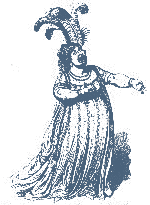| Opera -- let's face the truth -- is a little ridiculous. Or at least it can look that way. You've got women on stage wearing breastplates; you've got men playing ancient Egyptian warriors, raging hunchbacks, or barbers who for no known reason run around yelling "Figaro!" Worse yet, all these unnatural characters sing. That really makes no sense, especially since (a) they sing in overstuffed operatic voices, and (b) they do it, most of the time, in Italian or some other foreign language. Still, people all over the world love this crazy art form. What do they see in it? |
| Well, let's start with the
singing. It's not realistic, of course. But it does have
one big advantage over ordinary speech -- it's far more
passionate. Imagine, for a moment, a typical operatic
situation. The hero is about to die; he sings one last
farewell to his beloved. Would anyone doing that in real
life speak in an ordinary tone? In an opera house, once
you understand what's going on, the surging passion of
the hero's operatic voice is entirely appropriate. And
that, in turn, helps explain why opera plots are so often
exotic. Because it's so emotional, opera works best when
the characters on stage swear vengeance or eternal love,
and not so well when they're saying "Betty, please
pass the salt." Recognizing this, composers have
traditionally written operas with stories in which --
even if the plot has to be set in ancient Egypt --
thoughts like passing the salt will never, ever arise. In Verdi's operas, the same thing happens, but it's much more romantic. "It's strange," sings Violetta, the worldly, skeptical heroine of La Traviata, musing in recitative about a man she just met. "His words really touched my heart." But the orchestra is already playing her accompaniment. So when her music blooms into a deeply emotional aria ("Is this the man who can bring love to my troubled soul?"), the sweep of passion continues without an audible break. |
 |
|
Each year, Opera America (which
represents the nation's opera companies) tallies the
operas most frequently performed in the United States.
Here are ten works that almost always make the list. La Boheme (Puccini)
Tosca (Puccini)
Madama Butterfly (Puccini)
La Traviata (Verdi)
Rigoletto (Verdi)
The Barber of Seville (Rossini)
The Marriage of Figaro (Mozart)
Don Giovanni (Mozart)
The Magic Flute (Mozart)
Carmen (Bizet)
copyright © 1995 by Greg Sandow
|